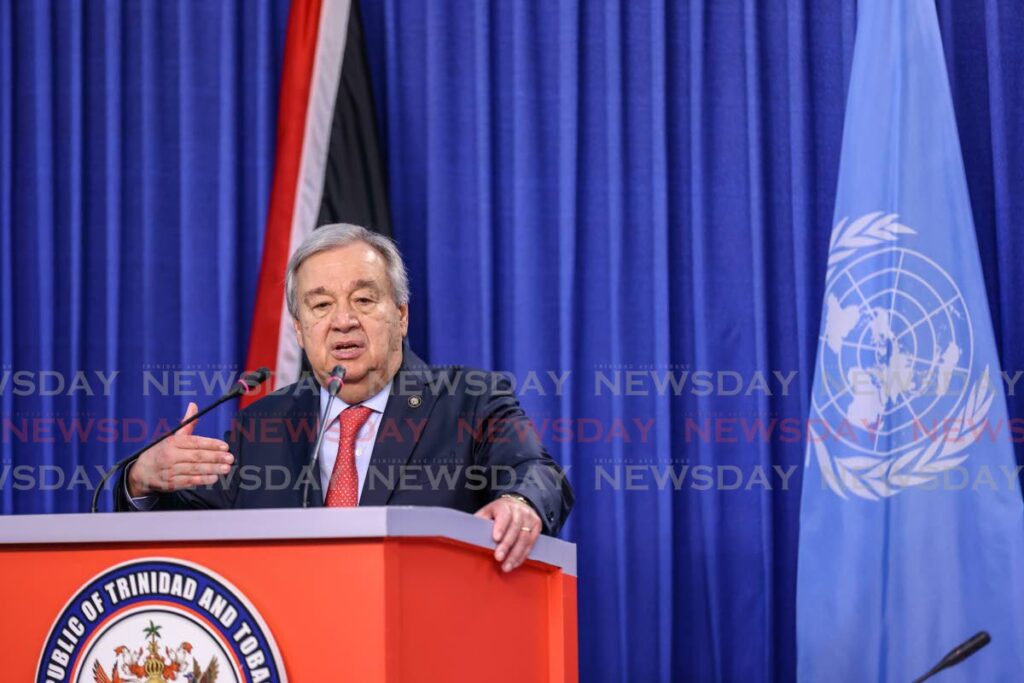UN Secretary General: Climate-change funding for small islands must change

UN Secretary-General António Guterres says the time has come to change how small-island developing states access global funding to address the effects of climate change and local development.
Responding to questions from the media at the Diplomatic Centre, St Ann’s, during a joint press conference with the Prime Minister on Monday morning, Guterres gave an example of some African countries spending more in repaying debt than they do in addressing their health care systems.
“This is the kind of injustice that should not prevail in today’s world,” he said.
He said there is a greater need for stronger action from multi-national and inter-development banks to change their business models to leverage private financing that will be used not to only finance offsetting the effects of climate change but personal development for countries.
“Small island states need support and funding,” Guterres said, adding that some are regarded as middle-income countries and are exempted from such assistance. He said this must also change.
“We see the need to increase funding for adaptation. Mitigation is essential. We must reduce emissions. We must not forget that many countries are suffering the impact of climate change, and those that suffer most are not those that contribute more to the problem.”
He said financing for small-income developing states is vital and the UN has been “strongly advocating for reform in the international financial architecture,” which he said was created after World War II. He said these systems must now adapt to the realities of today’s economies.
He said the climate change crisis is "threatening the very survival of small-island and low-lying coastal states.
"We must cut carbon emissions by 45 per cent in this decade to limit global heating to 1.5 degrees Celsius and avoid the worst impacts of climate change.
"It is still possible, but it requires action by everyone, on every front."
Because of this, he said, he has called for a climate solidarity pact in which "big emitters" will make extra efforts to cut emissions, and wealthier countries will mobilise financial and technical resources to support emerging economies.
"And it is why I have presented a plan to super-charge our efforts: the Acceleration Agenda, which includes calls to urgently scale up support for adaptation and operationalise the loss and damage fund this year.
"We must step up our actions on every front for people, for prosperity and for the planet."
He was asked by a reporter for the UN's position on TT being a producer of oil and gas in the context of the energy transition and its push for climate change.
He said the UN has a general position on fossil fuels, which is that it needs to be progressively phased out and "progressively have renewable energy as the way to sustain economic development in the world.
"I have advocated for what I call a just and equitable transition, which means not all countries need to be treated in the same way. And the rhythm and the logic of the phase out is different according to the different conditions that different countries might have. "
Asked which topic the UN is more focused on between climate change and the illegal import of guns, Guterres said both are essential.
"You cannot opt for one or the other. We need to face both challenges.
"Of course, climate change is an existential threat for the whole planet. The questions of gun trafficking and weapons trafficking are more geographically limited. But in a region like the Caribbean, I think today – and we discussed that with the Prime Minister – we tended in the past to look into arms and weapons trafficking as a kind of a sub product of drug trafficking but unfortunately, we are witnessing that arms trafficking are becoming a problem in itself. And are severely undermining the security of several countries and namely several countries in the region, and I believe it’s necessary to look into the arms trafficking as a serious threat to global peace and security and to adopt international measures in order to be able to curb this dramatic phenomenon. "


Comments
"UN Secretary General: Climate-change funding for small islands must change"